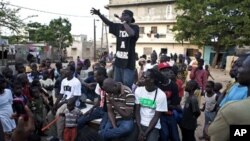A group of young musicians and journalists in Senegal has been at the helm of anti-government protests over the last few weeks.
Senegalese youth - fed up
Fadel Barro's living room is buzzing, even though it is late at night and the electricity is out - yet again.
Young men and women gather at the home of the local journalist, cramped together on couches, chatting and listening to music, sprawled on the floor next to flickering candles checking their Facebook updates, smoking on the balcony, and making ‘ataya’, the local Senegalese tea.
Over the last few months, it has become a clubhouse for members of a generation who say they are fed up with their government and a deteriorating quality of life. Nearly half of Senegalese are unemployed. Food prices are high. Blackouts are rampant.
Then their 85-year-old President, Abdoulaye Wade, tried to amend the constitution to make it easier for him to win re-election in February. That is when this group of young people said: “We're fed up” or “Y'en a marre” in French.
Raising youth awareness of government corruption, mismanagement
Alione Sane is a founding member of “Y'en a marre.”
Sane says it is a complicated time in Senegal. Y'en a marre was formed by young people who do not want what happened in Egypt or Tunisia to happen here. Sane says they do not want people setting themselves on fire and try to convince young people that when they burn the country it is not the government that suffers but its citizens.
Y’en a marre began organizing concerts, demonstrations, and public debates to encourage Senegalese to take a non-violent stand. But thousands of angry protesters took to the streets of Dakar June 23rd burning tires, ransacking government buildings, and fighting riot police outside the National Assembly.
It was the biggest unrest of President Wade's 10 years in power. His son Karim blamed political opponents for arming demonstrators. Fadel Barro is a pioneeer of the movement.
Barro says Senegalese authorities are trying to demonize their group, but Y'en a marre is non-violent. He says it is President Wade who is choosing violence. If Senegalese relate to Y'en a marre, Barros says it is because they want to change things through elections.
Encouraging youth to register to vote
Y’en a marre started the campaign “Das Fananal”, which means ‘My voting card, My weapon’ in the Wolof language. It is aimed at encouraging more than one million young, unregistered votes to sign up before October.
Former prime minister Macky Sall is a likely leading challenger to President Wade in next year's vote. Sall say he is encouraged by Y'en a marre's work.
Sall says Y’en a marre is now much bigger than the group itself. He says it has become a state of being to the people here - people who have had enough of the power cuts, the government, and its impunity. Sall says the initiative has a strong place in demanding that Senegal be governed with democracy, freedom, and peace.
The rapper known as Fou Malade, or “Crazy Fool” says Senegalese enjoy more freedoms of expression than Arab youth who sparked the uprisings across North Africa and the Middle East because, he says, their mouths were sewn shut.
Fou Malade says here in Senegal we have a type of freedom of expression. The moment people speak out, he says it is a way of freeing a type of violence that is building up inside and calming people down - liberating them, in a way. It allows them to turn what could be physical violence into a type of verbal outcry, just like the hip-hop movement in Senegal, which has a lot of power and is heard by just about everyone.
The group says there are now thousands of Y’en a marristes, as they have become known, both throughout Senegal and the diaspora.
Thiat is a Senegalese artists in the rap group Keur Gui. He has been jailed for speaking out against the government in the past, and says there is no going back now.
Thiat says he is ready - like everyone else in the room - to die because his people need it and it will help change things. They are not scared because it is not part of their vocabulary, he says. They are ‘Y’en a marristes ‘- a new type of Senegalese who are ready for change.
